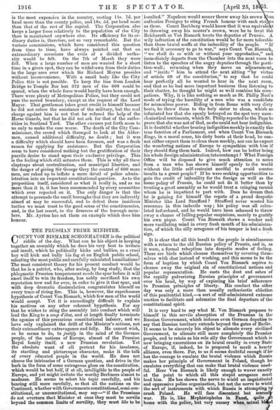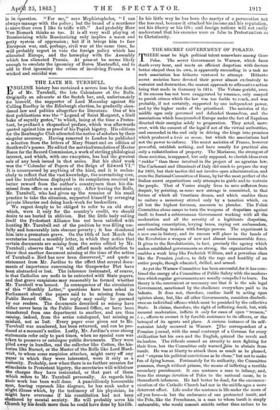THE PRUSSIAN PRIME MINISTER.
COUNT VON BISMARK SCHONHAUSEN is the political riddle of the day. What can be his object in keeping together an assembly which he does his very best to irritate and insult, which he politically kicks and bullies, as a cruel boy will kick and bully his fag at an English public school, selecting the most public and carefully calculated humiliations? The most consistent theory for his present conduct would be that he is a patriot, who, after seeing, by long study, that the phlegmatic Prussian temperament needs the spur before it will exert itself to win its freedom, has nobly sacrificed his own reputation now and for ever, in order to give it that spur, and with deep dramatic dissimulation congratulates himself on every trace of rising fire. This is, however, the superhuman hypothesis of Count Von Bismark which few men of the world would accept. Yet it is exceedingly difficult to explain his motives on any other coherent hypothesis. For say that he wishes to sting the assembly into conduct which will lead the King to a coup d'etat, and at length finally terminate the agonies of this precarious constitutional infancy, and we have only explained the drift of the Minister's actions, not their extraordinary extravagance and folly. He cannot wish, as he seems to do, to justify in the mind of the German people, of the nations of Europe, almost of the Prussian Royal family itself, a new Prussian revolution. Yet the absolute want of all pretext for his insolence, its startling and picturesque character, make it the talk of every educated people in the world. He does not choose the intricacies of a German question, and drive in the barb in the form of some outrageous gloss on the constitution, which would be but half, if at all, intelligible to the people of Europe, and yet might irritate the worthy Berliners almost to madness. He seems to seleet his topic carefully, and his bearing still more carefully, so that all the nations on the Continent, whether with Governments constitutional, semi-con- stitutional, or unconstitutional, may say—" if the Prussians do not overturn that Minister at once they must be servile beyond the common limits of servility, they must like to be insulted." Napoleon would sooner throw away his crown ban authorize Persigny to sting French honour with such strijcs as these. Count Rechberg would know that it was equivale t to throwing away his master's crown, were he to treat th Reichsrath as Von Bismark treats the deputies of Prussia. A. wily infraction of the constitution would be far more tolerable than these brutal scoffs at the imbecility of the people. "If we find it necessary to go to war," says Count Von Bismark, "we shall do so with of without your approbation," and, immediately departs from the Chamber into the next room to listen to the speeches of the angry deputies through the parti- tion-wall; returning when they move an adjournment. and " invite " him to attend the next sitting "by virtue of article 60 of the constitution," to say that be could hear perfectly all he wanted to hear in the next room, and that as he had more important business than listening to. their chatter, he thought he might as well combine his occu- pations. Why, it is like nothing so much as St. Philip Hen's. mode of trying the humility of a nun who was a candidate for miraculous power. Riding in from Rome with very dirty boots, he threw them to the holy sister to clean, which so. infuriated her that she openly betrayed on the spot very unec- elesiastieal sentiments, which St. Philip reported to the Pope to, prove that she was not of God, as she could not beer indignities. It is doubtful whether bearing indignities meekly is exactly the- true function of a Parliament, and when Count Von Bismark. flings, in a moral sense, his dirty boots at their head, be can- not either expect them to clean them meekly, nor can he expect the wondering nations of Europe to sympathize with him if they should fling them back. indeed, how can he better bring; his whole foreign administration into contempt ? What Foreign. Office will be disposed to give ranch attention to notes fcom a man who has shown himself openly to the world without the little self-restraint needful to avoid wanton, insults to a great people? If he were seeking opportunities to. gain the credit of imbecility for the foreign as well as the home policy of Prussia, he could not do it bettor than by treatine's a great assembly as he would treat a cringing menial whom he is impatient to part with. Does he dream that. he is gaining for himself the repnte of a proud despotio. Minister like Lord Strafford ? Strafford never wasted his. resources in this imbecile way; his policy was all calcu- lated beforehand, and he would have been ashamed to throw away a chance of lulling popular suspicions, merely to gratify. his own pique. Count Von Bismark shows a weaker and more vacillating mind in every fresh month of his administra- tion, of which the silly arrogance of his temper is but a fresh sign.
It is clear that all this insult to the people is simultaneous. with a return to the old Russian policy of Prussia, and is, as it were, a formal rebaptism into despotic modes of feeling. There are birds which cleanse themselves by covering them- selves with dust instead of washing, and this seems to be the form of baptism by which Count Von Bismark aspires to, cleanse away the original sin of constitutional notions and popular representation. He casts the dust and ashes of the rapidly pulverizing Russian principles of government over his head, by way of expiating his brief adherence to Prussian principles of liberty. His conduct the other day was only a more than usually enthusiastic ablution of this penitential kind,—a sort of self-administered extreme unction to facilitate and solemnize the final departure of the- constitutional spirit.
It is very hard to say what M. Von Bismark proposes to. himself in this servile absorption of the Prussian in the. Russian Government, which induces even German deputies to say that Russian territory extends beyond the gates of Berlin. It seems to be sincerely his object to alienate every civilized Government, to alienate still more completely the Prussian people, and to retain as his sole ally the Government which is now bringing execrations on its brutal cruelty in every State. of Europe, if; indeed, he is prepared to merit a. hearty affiance, even there. For, to us it seems doubtful enough if he has the courage to emulate the brutal violence which Russia, makes her principle of Government in Poland, though he emulates everything that can make that brutal violence need- ful. Herr Von Bismark is likely enough to waver exactly at the point to which all this stupid arrogance meat lead him. He has shown the nerve to wield an inquisitorial and oppressive police organization, but not the nerve to wield the sort of instruments with which Russia is attempting, t crush Poland. He will face discontent but scareel war. He is, like Mephistopheles in 434, quite home with the police, but very uneasy "AIN aptual b is in question. "For me," says Mephistopheles, "I can alwns manage with the police; but the brand of a murderer is More than even I like to trifle with." And probably Herr Von Bismark thinks so too. It is all very well playing at Russianizing while Russianizing only implies a mean and petty system of oppression; but if it brings him to face European war, and, perhaps, civil war at the same time, he will probably regret in vain the foreign policy which has alienated Europe, and the horseplay with the Assembly which has alienated Prussia. At present he seems likely enough to emulate the ignominy of Baron Manteuffel, and to add to that ignominy the crime of involving Prussia in a wicked and suicidal war.































 Previous page
Previous page